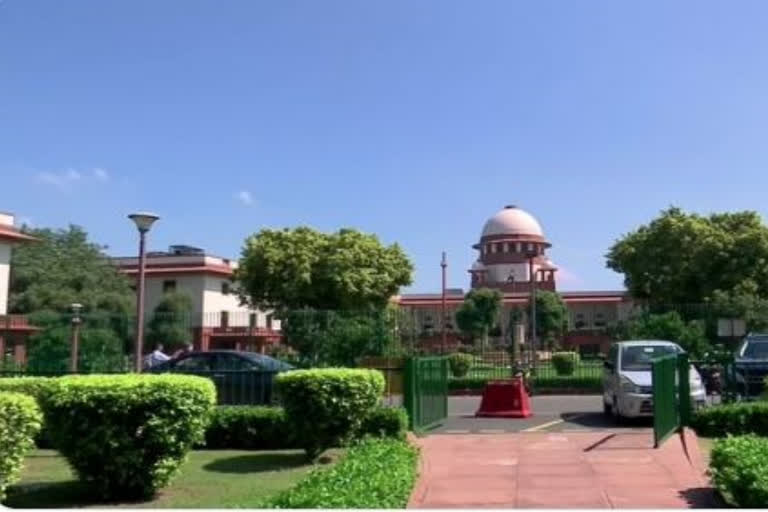Srinagar(Jammu and Kashmir):The Supreme Court on Monday dismissed a plea challenging the government's decision to constitute the Delimitation Commission for redrawing the Assembly and Lok Sabha constituencies in the Union Territory of Jammu and Kashmir.
A bench headed by Justice Sanjay Kishan Kaul and comprising Justice AS Oka delivered the verdict on a plea filed by two Kashmir residents, clarifying that the decision on delimitation would not affect a separate batch of matters where abrogation of Article 370 is under challenge before a constitution bench of the apex court.
While pronouncing the verdict, Justice Oka said nothing in this judgement shall be construed as giving an imprimatur to the exercise of power under clauses one and three of Article 370 of the Constitution. The bench observed that issue of validity of the exercise of power relating to Article 370 is subject matter of petitions pending before the apex court. The top court is seized of petitions challenging the constitutional validity of the Centre's decision to abrogate provisions of Article 370 on August 5, 2019.
The detailed judgment will be uploaded later in the day. The petitioners -- two Srinagar residents, Haji Abdul Gani Khan and Dr Mohammad Ayub Mattoo, challenged the increase in the number of seats from 107 to 114 in the UT. The petitioners had argued that it was ultra vires Articles 81, 82, 170, 330 and 332 of the Indian Constitution and Section 63 of the Jammu & Kashmir Reorganisation Act, 2019.
Following the abrogation of Article 370 in August 2019 dividing the erstwhile state of Jammu and Kashmir into two union territories, the Delimitation Commission was appointed to redraw the Assembly constituencies of J&K. The commission submitted its report recommending 90 Assembly constituencies in the Union Territory.
Several petitions have been filed in the apex court challenging the Centre's decision to abrogate provisions of Article 370 and the Jammu and Kashmir Reorganisation Act, 2019, which split J-K into two Union Territories Jammu and Kashmir, and Ladakh. By abrogating Article 370, the Central government had revoked the special status of Jammu and Kashmir.
The apex court had on December 1 last year reserved its verdict on the plea challenging the government's decision to constitute the delimitation commission. The Centre had then told the top court that the delimitation commission formed to redraw the legislative assembly and Lok Sabha constituencies in Jammu and Kashmir was empowered to do so.
Also read:SC reserves judgment on plea challenging J-K delimitation
Seeking dismissal of the plea, Solicitor General Tushar Mehta, appearing for the Centre, had argued that the Jammu and Kashmir Reorganisation Act, 2019 does not preclude the establishment of Delimitation Commission by the Central government. On March 6, 2020, Union Ministry of Law and Justice (Legislative Department) had issued a notification in exercise of power under section 3 of the Delimitation Act, 2002, constituting a Delimitation Commission, with former Supreme Court judge (Retd) Ranjana Prakash Desai as the chairperson.
The counsel appearing for the two petitioners, Haji Abdul Gani Khan and Mohammad Ayub Mattoo, had argued that the delimitation exercise was carried out in contravention of the scheme of the Constitution and alteration of boundaries and inclusion of extended areas should not have been done.
The plea had sought declaration that the increase in the number of seats from 107 to 114 (including 24 seats in Pakistan occupied Kashmir) in Jammu and Kashmir is ultra vires constitutional provisions and statutory provisions, particularly under section 63 of the Jammu and Kashmir Reorganisation Act, 2019. It had said the last delimitation commission was set up on July 12, 2002 in exercise of powers conferred by section 3 of the Delimitation Act, 2002 after the 2001 census to carry out the exercise throughout the country.
The plea had said the commission had issued guidelines and methodology for the delimitation of assembly and parliamentary constituencies vide letter dated July 5, 2004 along with the constitutional and legal provisions. "It clearly stated that the total number of existing seats in the Legislative Assemblies of all states, including UTs of the National Capital Region and Pondicherry, as fixed based on the 1971 census shall remain unaltered till the first census to be taken after the year 2026," the plea had submitted.
It had sought to declare as unconstitutional the notification dated March 6, 2020 constituting the delimitation commission to take up delimitation in the UT of J-K and states of Assam, Arunachal Pradesh, Manipur, and Nagaland by the Centre. The plea had also challenged the consequential omission of Assam, Arunachal Pradesh, Manipur and Nagaland from the process of delimitation vide notification dated March 3, 2021, claiming that it amounts to classification and violates Article 14 (equality before law) of the Constitution. (With Agency Inputs)
